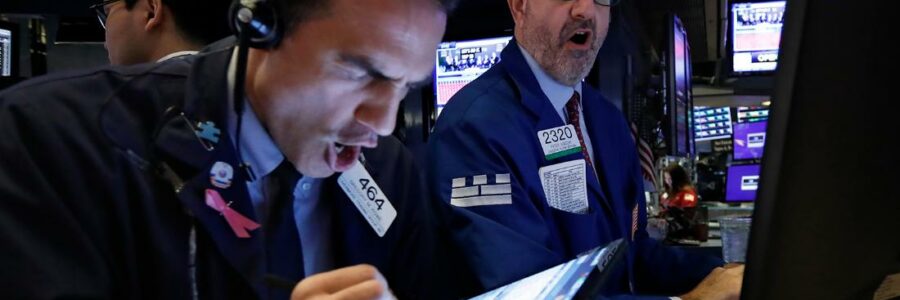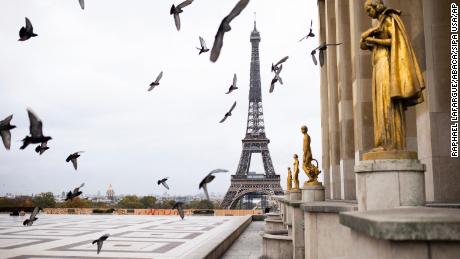
Jerome Powell: US economy 'some time' away from full recovery
A version of this story first appeared in CNN Business’ Before the Bell newsletter. Not a subscriber? You can sign up right here.
London (CNN Business)It’s been nearly a year since the coronavirus pandemic ended the S&P 500’s longest-ever bull run and sent stocks everywhere into a violent nosedive. The turmoil was a fitting start to a year of frenzied activity.
The virus continues to wreak havoc on our daily lives, but markets have long since forgotten the painful reckoning.
The big bang: March 12, 2020 handed Wall Street its worst day of losses in over three decades. The S&P 500 (DVS), Dow (INDU) and Nasdaq Composite (COMP) suffered double-digit declines, with the pan-European Stoxx 600 (SXXL) index logging its worst day on record.
The collapse felt particularly shocking because markets had been shrugging off the coronavirus for weeks, even as alarm bells sounded in various corners of the global economy.
But sentiment shifted abruptly when former President Donald Trump banned travel from most of Europe and the World Health Organization officially declared Covid-19 a pandemic on March 11.
It’s been a wild ride since. The crash was short lived and financial markets, fueled by government stimulus, powered through a devastating global downturn to end the year at record highs — a stark reminder of the disconnect between Wall Street and Main Street.
The latest: Many of the hallmarks of 2020 are still evident — and not just in lockdowns, social distancing and working from home. The exuberance that’s defined equity markets over the past 12 months has kept pushing stocks to all-time highs this year.
The rise of retail traders, who revved last year’s rally, continues unabated — as captured by the extraordinary GameStop saga and the recent launch of an ETF focused on stocks generating social media buzz.
The coronavirus is still with us, too, but investors are now banking on a swift and strong recovery as vaccine rollouts gather pace and the United States gears up for another enormous stimulus package.
Goldman Sachs predicts 7% US GDP growth in 2021, a level not seen since 1984.
Big risk: Like this time last year, equity investors may be underestimating the size of potential stumbling blocks. Ironically, a booming economy may not be good for stocks because it could increase funding costs for companies and rob equities of their main selling point: superior returns.
Bond yields have moved higher on increased inflation expectations, although from rock-bottom levels. Still, the shift has caused stock markets to wobble in recent days over fears that central banks could lift interest rates to prevent soaring prices and might rein in asset purchases sooner than anticipated, taking excess cash out of markets.
While a strong recovery is good for corporate earnings, higher rates make debt more expensive, which could become a problem for companies that have borrowed heavily through the crisis. Stocks also look relatively less attractive when bond yields rise.
Keep calm: The Federal Reserve has made it clear that it’s willing to tolerate higher inflation if it means businesses are recovering and unemployment is in decline.
While predicting an increase in consumer prices this summer, Fed chair Jerome Powell said Thursday that inflation would need to be sustained at 2% and the economy reach close to maximum employment before the central bank would consider increasing interest rates.
Given that the US labor market is still short about 10 million jobs since the pandemic hit, it may be some time yet before rates get picked up off the floor.
“The backdrop will remain supportive for equities in 2021,” head of equities at London & Capital, Roger Jones, told me. “Longer term structural headwinds to inflation — demographics, technology advancement and high levels of debt — are stronger than ever. Additionally, equities can cope with inflation as long as it’s not sustained above the 3% level,” Jones said.
The European Central Bank could have a new problem
A sustained increase in consumer prices may seem a long way off in Europe, where economic activity remains severely constrained by lockdowns, stimulus is limited and the outlook for GDP growth this year has weakened.
Despite all this, inflation has ticked up in the region and if bond yields keep rising policymakers could eventually be forced to take action.
What’s happening: The European Central Bank meets Thursday and investors will want to know how it’s thinking about inflation. They’ll also want some reassurance from ECB President Christine Lagarde that the central bank has no plans to tighten financing conditions.
“The ECB will primarily try to downplay the recent increase in bond yields, calling it small in magnitude, driven by technical factors and focusing on real yields,” head of research at ING Carsten Brzeski wrote in a note Friday.
Brzeski expects the ECB to stress that asset purchases could be increased if necessary and move to frontload stimulus in the coming weeks to keep funding conditions favorable.
See here: In an interview last month with The Economist Lagarde said that the ECB has used roughly €800 billion ($955 billion) of its €1.8 trillion ($2.1 trillion) Pandemic Emergency Purchase Program.
“We still have a lot. If we need it all, we’ll use it all,” she added.
Still, as recent volatility in bond markets indicates, a lot can change in a few weeks. Once economies reopen, a sudden rush for goods and services could lead businesses to hike prices. Excess savings in Europe will also juice the recovery if households spend some of that extra cash.
“Once restrictions get lifted and fear of the virus retreats, it is reasonable to expect that prices will increase,” ING economists including Brzeski wrote in a note last week. “Eurozone headline inflation could easily accelerate above the magic 2% level this year.”
Big picture: At least for now, Europe’s economy looks a long way from overheating. GDP contracted again in the final three months of last year amid fresh lockdowns and, with many of those measures still in place, growth is unlikely to fare much better in the first quarter.
A sluggish vaccine rollout and relatively modest stimulus will also weigh on Europe’s recovery. In the absence of an increase in wages, the ECB is unlikely to react to short-term moves in inflation, Brzeski said.
Up Next
Monday: Bank of England Governor Andrew Bailey speaks on the UK economy; Stitch Fix (SFIX) earnings
Tuesday: Japan, South Africa and EU GDP; US NFIB survey; Dick’s Sporting Goods (DKS) and H&R Block earnings
Wednesday: US and China CPI; Cathay Pacific (CPCAY), Campbell Soup (CPB), AMC Entertainment (AMC) and Oracle (ORCL) earnings
Thursday: ECB decision; OPEC report; US initial jobless claims; JD.com (JD) and Ulta Beauty (ULTA) earnings
Friday: US PPI and consumer sentiment, EU industrial production
Source: Read Full Article

